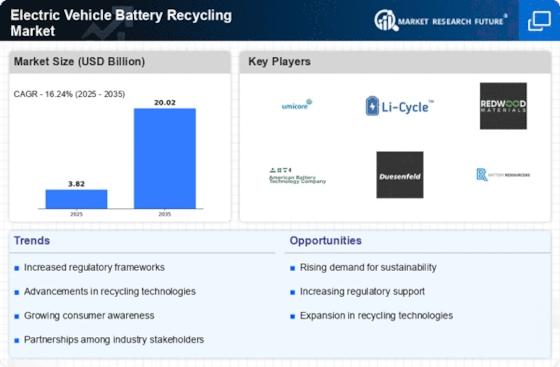Top Industry Leaders in the Electric Vehicle Battery Recycling Market
*Disclaimer: List of key companies in no particular order
Dynamics and Strategies in the Electric Vehicle Battery Recycling Market: A Comprehensive Analysis
The rapid growth of the electric vehicle (EV) market brings forth a crucial question: What happens to spent batteries? Enter the EV battery recycling market, a burgeoning yet swiftly evolving sector with significant implications for sustainability and resource security. In this dynamic landscape, competition is intense, with established entities, innovative startups, and automotive giants all striving for supremacy.
Key Players and Their Strategic Approaches:
Traditional Recycling Giants: Companies like Glencore and Umicore utilize their existing infrastructure and metal refining expertise to emerge as leaders. Glencore, in partnership with Redwood Materials, has established a large-scale recycling facility in North America.
Battery Manufacturers: EV giants such as Tesla and BMW are vertically integrating, investing in recycling capabilities to secure vital battery minerals and ensure closed-loop supply chains. Tesla's partnership with Redwood Materials focuses on recycling lithium-ion batteries, while BMW has invested in the German recycling startup Duesenfeld.
Recycling Technology Innovators: Startups like Redwood Materials and Li-Cycle disrupt the market with novel, efficient, and eco-friendly recycling technologies. Redwood Materials boasts a closed-loop process for recovering cathode and anode materials, while Li-Cycle utilizes hydrometallurgy for high-purity metal extraction.
Automakers and Collaborators: Major automakers like Volkswagen and Nissan collaborate with established recyclers and startups to secure recycled materials for future battery production. Volkswagen has partnered with Umicore, and Nissan collaborates with Redwood Materials for battery recycling in Europe.
Factors Influencing Market Share:
-
Technology Efficiency and Sustainability: Companies employing closed-loop processes, minimizing waste, and achieving high-purity recovered materials will gain a competitive edge.
-
Cost-Effectiveness: Optimizing collection, transportation, and processing systems is crucial for maintaining cost competitiveness.
-
Scale and Partnerships: Establishing strategic partnerships and building large-scale recycling facilities will be key to securing market share.
-
Geographical Presence: Expanding operations across key EV markets like Europe, Asia, and North America will be crucial for achieving global reach.
-
Regulatory Compliance: Navigating the evolving regulatory landscape surrounding battery recycling and waste disposal will be essential.
New and Emerging Trends:
-
Direct Recycling: This technology bypasses the hydrometallurgical process, directly reusing cathode and anode materials in new batteries, potentially significantly reducing costs and environmental impact.
-
Battery Passporting: Tracking batteries from production to end-of-life through digital platforms will enhance transparency and facilitate efficient recycling logistics.
-
Second-Life Applications: Repurposing spent batteries for less demanding applications like stationary energy storage can extend their lifespan and reduce waste.
-
Focus on Rare Earth Elements: Efficient recovery of critical elements like cobalt and lithium will be crucial for securing a sustainable supply chain.
The EV battery recycling market, currently fragmented, lacks clear frontrunners. However, companies focusing on technological innovation, strategic partnerships, and cost-effective operations are poised to gain market share. Collaboration between established players, startups, and automakers will be crucial for scaling up recycling infrastructure to meet the burgeoning demands of the EV market. Anticipate further consolidation and competition as regulations evolve and consumer demand for sustainability grows, driving technology advancements and cost reductions.
As the industry matures, its role in ensuring the long-term success of the EV revolution by securing vital resources, mitigating environmental impact, and promoting a circular economy for batteries becomes increasingly critical.
Industry Developments and Latest Updates:
C.C.U.R.E.C. Recycling GmbH (Germany):
- November 2023: Signed a partnership with BMW for closed-loop recycling of lithium-ion batteries from electric vehicles. (Source: C.U.R.E.C. press release, Nov 16, 2023)
American Manganese Inc. (Canada):
- September 2023: Successfully tested its RecycMet technology on lithium-ion batteries from Tesla Model S, achieving 99.5% recovery of cathode metals. (Source: American Manganese press release, Sept 19, 2023)
- December 2023: Announced plans to build a battery recycling demonstration plant in New York state using its RecycMet technology. (Source: American Manganese press release, Dec 5, 2023)
Battery Solutions (U.S.):
- August 2023: Completed construction of its first lithium-ion battery recycling facility in California, with an initial capacity of 8,000 tons per year. (Source: Battery Solutions press release, Aug 8, 2023)
Li-Cycle Corp. (Canada):
- July 2023: Opened its second Spoke facility in Arizona, expanding its lithium-ion battery recycling capacity to 25,000 tons per year. (Source: Li-Cycle press release, Jul 18, 2023)











